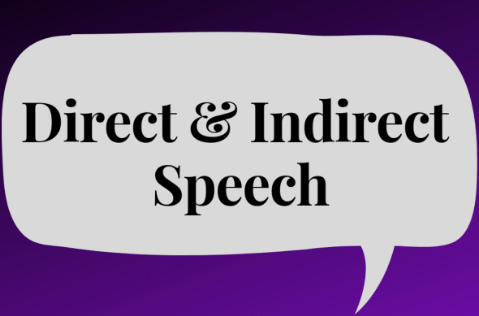Introduction
- Direct Speech
Direct speech repeats or quotes the expressed or the words spoken. When we use direct speech, we place the words spoken between the quotation marks (“ First-person”). Direct speech is directly conveyed either in speech or in writing. - Indirect Speech
Indirect speech or Reported speech is usually used to talk about the past, so we normally change the tense of the words spoken into. We use reporting verbs like ‘tell’, ‘say’, ‘ask’ and we can use the word ‘that’ to introduce the reported in place of (“ ”) Direct and Indirect speech also introduces the concept of ‘Reported speech’ and ‘Reported Verb’.

Theory
Direct and Indirect Speech is used in any instances during written and verbal communication we need to repeat a statement or action of someone. It is used to describe what someone said in a direct indirect approach. The two approaches are used depending upon the type of conversation (formal or informal). Informal communication Direct Speech is not used unless it is a quote. Indirect Speech is preferred.
Tips
He said to me, “I will go there tomorrow.” In the above example,
- Reporting verb – Who said to whom.
‘He said to me’: it is reporting verb - Reported speech – The exact words spoken, put within inverted commas “_______”.
I will go there tomorrow-: it is reported speech
Solved Examples
Question for Tips & Tricks: Direct & Indirect Speech
Try yourself:He exclaimed with joy that India had won the Sahara Cup.
Explanation
The statement given is: "He exclaimed with joy that India had won the Sahara Cup." We need to choose the correct option that represents this statement in reported speech.
Let's analyze each option:
Option A: "He said, 'India has won the Sahara Cup'"
- This option changes the exclamation and joy expressed in the statement to a simple statement. It does not reflect the original excitement.
Option B: "He said, 'India won the Sahara Cup'"
- This option also changes the exclamation and joy expressed in the statement to a simple statement. It does not reflect the original excitement.
Option C: "He said, 'How! India will win the Sahara Cup'"
- This option changes the tense of the reported statement. The original statement is in the past tense, but this option uses the future tense. It is not correct.
Option D: "He said, 'Hurrah! India has won the Sahara Cup'"
- This option correctly represents the original exclamation and joy expressed in the statement. It uses the word "Hurrah!" to convey the excitement and reports the statement in the past tense.
Therefore, the correct option is D: "He said, 'Hurrah! India has won the Sahara Cup'".
Report a problem
Question for Tips & Tricks: Direct & Indirect Speech
Try yourself:Nita ordered her servant to bring her cup of tea.
Explanation
The correct answer is option C:
Nita said to her servant, "Bring me a cup of tea."
Explanation:
To determine the correct answer, we need to understand the structure and context of the given sentence.
1. Nita ordered her servant to bring her cup of tea.
- In this sentence, Nita is giving an instruction or command to her servant to bring her a cup of tea.
Now let's analyze each option:
Option A:
Nita told her servant, "Bring a cup of tea."
- This option accurately conveys the command given by Nita to her servant. However, it doesn't specify that Nita wants the tea for herself.
Option B:
Nita said, "Bring me a cup of tea."
- This option is a more direct and concise way of expressing the command. It clearly indicates that Nita wants the tea for herself.
Option C:
Nita said to her servant, "Bring me a cup of tea."
- This option is grammatically correct and accurately represents the command given by Nita. It specifies that Nita is requesting the tea from her servant.
Option D:
Nita told her servant, "Bring her that cup of tea."
- This option suggests that Nita wants her servant to bring a specific cup of tea to someone else, not herself. It doesn't match the given context.
Therefore, option C is the most suitable answer because it accurately represents the command given by Nita and specifies that she wants the tea for herself.
Report a problem
Question for Tips & Tricks: Direct & Indirect Speech
Try yourself:"Please don't go away", she said.
Explanation
The given statement, "Please don't go away," can be interpreted in different ways. Let's analyze each option to determine the closest meaning.
Option A: She said to please her and not go away.
- This option implies that the speaker is requesting the listener to stay to please her.
- However, the original statement does not mention anything about pleasing the speaker.
Option B: She told me to go away.
- This option contradicts the original statement, as the speaker is asking the listener not to go away, not telling them to go away.
Option C: She begged me not to go away. (Correct Answer)
- This option accurately represents the original statement, where the speaker is pleading with the listener not to leave.
- The use of the word "begged" conveys a strong emotional appeal.
Option D: She begged that I not go away.
- This option is similar to option C but includes the word "that" before the statement.
- Both options C and D are correct, but option D may sound slightly more formal.
Therefore, the correct answer is Option C: She begged me not to go away.
Report a problem






















